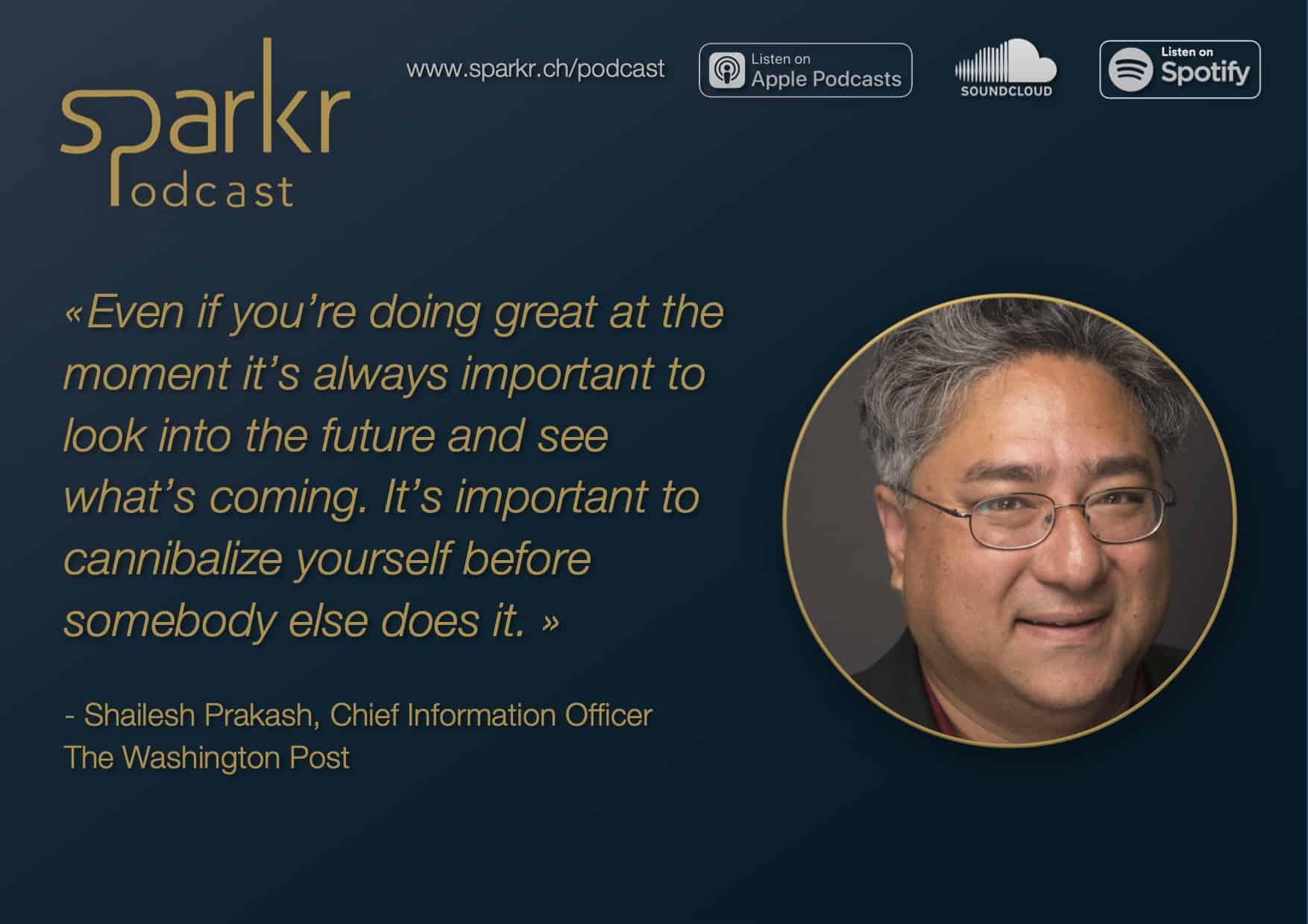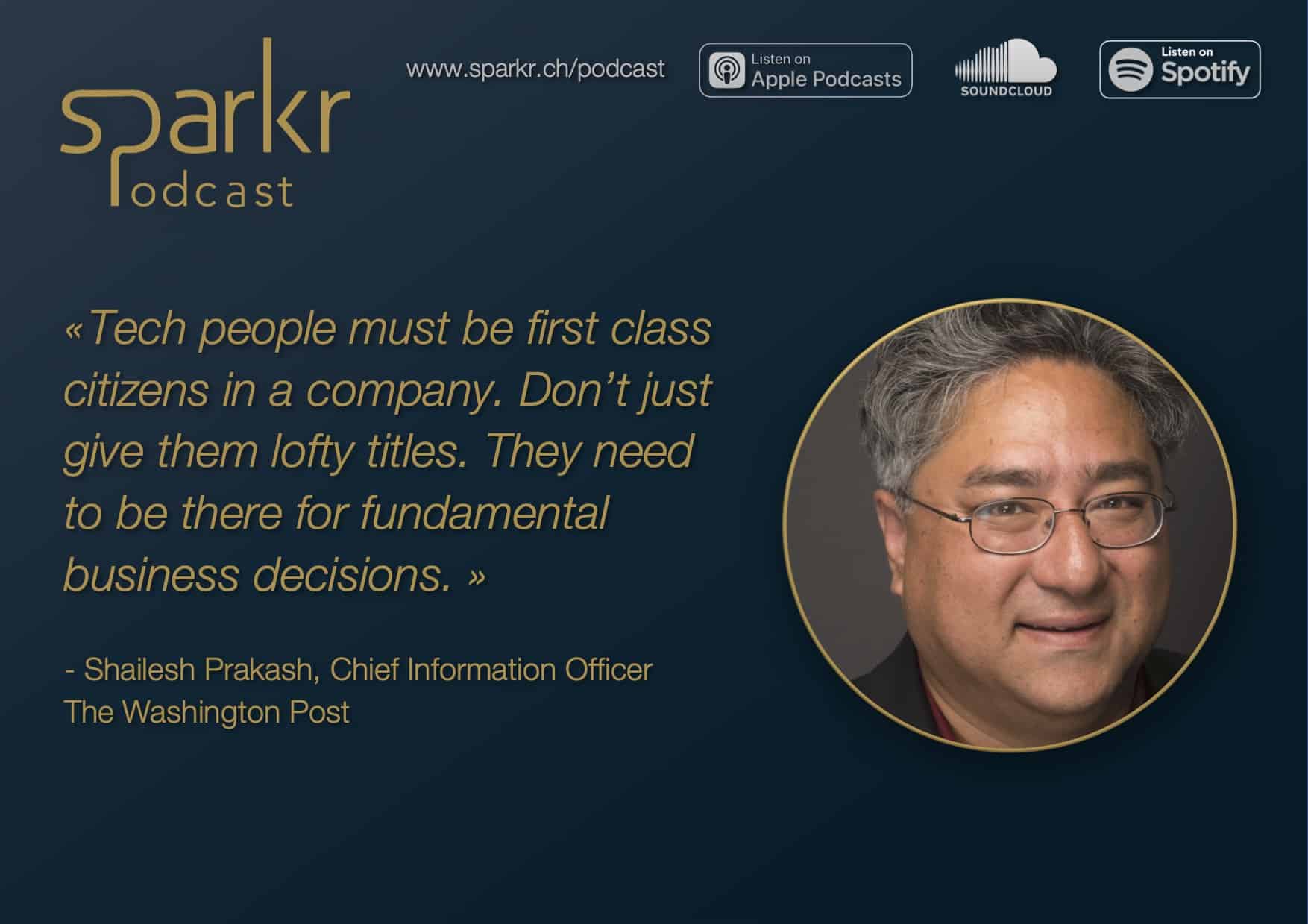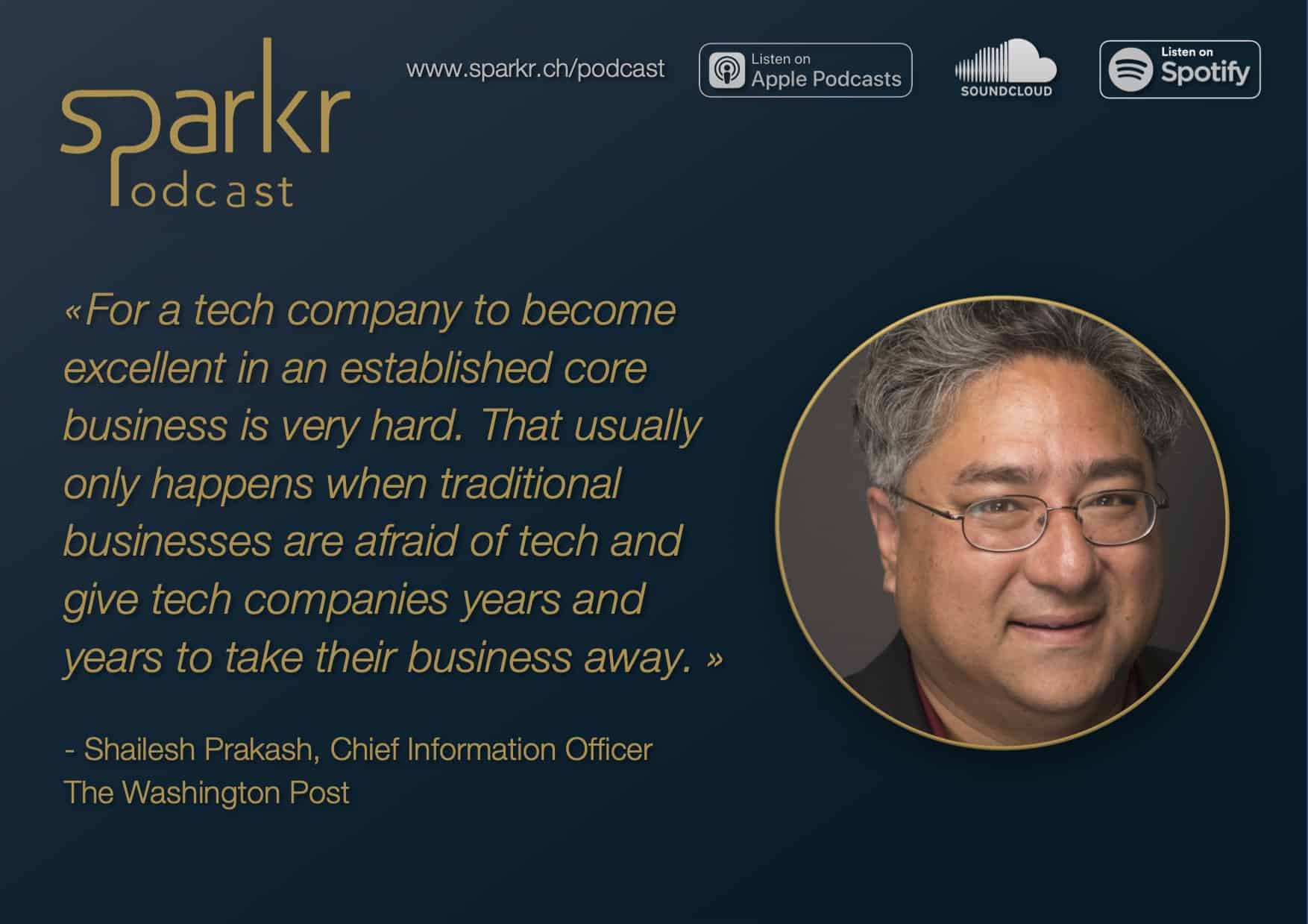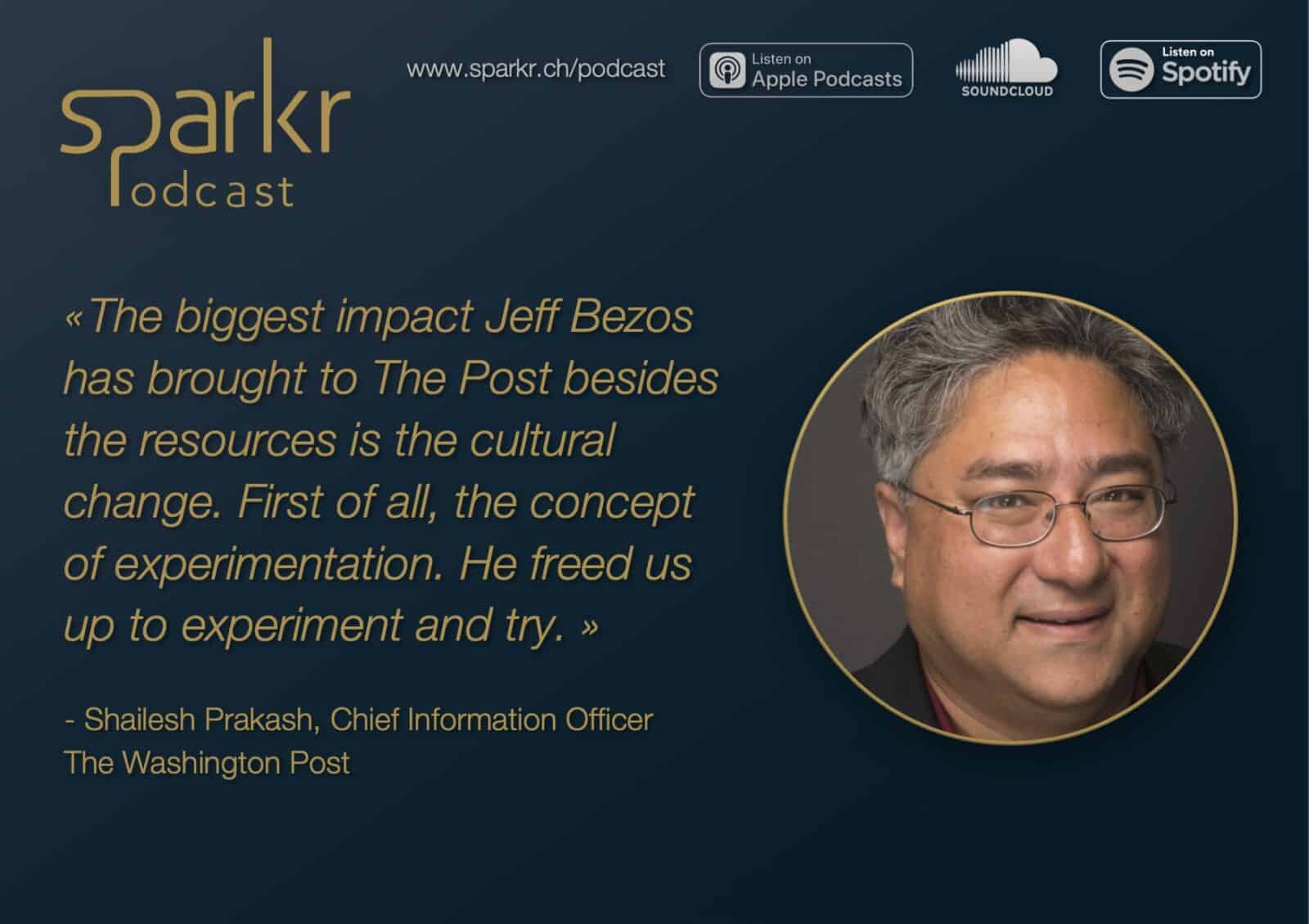The Washington Post is among the most renown journalistic institutions in the world. Nonetheless, like every other player in the publishing space The Post also had to deal with the disruption of its revenue streams.
In 2013, the founder of Amazon, Jeff Bezos, purchased The Post and with that, an exciting transformation was initiated which would take a leading brand from a traditional industry under threat and turn it into a digital power house and the 8th most innovative company of 2018 according to Fast Company.
Transforming a (Traditional) Business into a Digital Power House
Shailesh Prakash is the Chief Information Officer at The Washington Post and responsible for digital products. Shailesh joined The Post in 2011 and has been a driver of its digital transformation ever since. With his work and the effort of his team and the exceptional newsroom, The Post increased its monthly US unique visitors from 20 Mio in 2013 when Jeff Bezos bought The Post to 100 Mio in 2018. That’s a 5x growth in only 5 years!
What are the cultural factors, business mindsets, technologies and metrics which contributed to The Washington Post successfully transforming into a tech savvy company with digital at its core next to the long tradition of exceptional journalism? That’s what I was able to talk about with Shailesh in this podcast and I’ll write down some of the main take-aways in the following paragraphs.
Digital Transformation Innovation Washington Post Shailesh Prakash Journalism
Culture and Business Mindset
When Jeff Bezos purchased The Washington Post, he did not only pour in financial resourses but he also sparked and accelerated a cultural shift and a change of mindset within the journalistic institution.
Bezos encourages experimentation, speed and doubling down on what works well compared to trying to fix what’s not working. Bezos would often ask if a decision is a “one-way-door” – a decision from which there’s no turning back. Whenever the answer is no, it won’t hurt to experiment and try new things. And if such experiments would show positive surprises, there will be an emphasis on doubling down on them.
Speed is critical because technologies are never isolated. They build on each other and create exponential developments. What might be perceived as slow moving in the beginning can accelerate very quickly and exponentially. If you stick your head in the sand for only slightly too long, you’ll lose your chance to catch up with the rest.
All of these principles lead to a corporate culture with which you are "embracing change" and with which you are "experimenting with new technologies rather than run from them", as Shailesh puts it. With that mindset, The Washington Post is not only doing journalism but is also creating an exciting digital product what could be called the AWS for publishing.
Amazon Web Services or AWS is a huge success story. Amazon started selling books online. In 2006 they started AWS because they realized that their experience with managing and running the large server farms of Amazon's e-commerce business could be turned into a product itself and be sold as a service to everyone who does business online. That’s how Amazon entered the Cloud industry and is dominating it to this day. Today, AWS is used by big shots like Netflix or Dropbox. Take something you are great in from your core business and turn it into a great service for others.
That’s what The Washington Post is doing with Arc – the AWS for publishing. Arc provides everything you need to run a serious publishing business (no matter if that’s journalism, broadcasting or if you’re running a large brand). And that’s just one example how The Post – a journalistic institution which is also becoming a digital tech company – is not running away from change but is actually shaping it and profiting from it. Each transformation poses difficulties and opportunities.
But this kind of transformation can only be successful if the leaders of a company believe in technology, its opportunities and in the underlying principles. Because this is so critical for a successful business, these principles (experimentation, speed, doubling down) are a North Star for executives like Shailesh.
Operations
“How fast do you move?”, “There are no sacred cows“, “Debate but commit”, “Multiple paths to yes”. These are some of the questions or rules that executives like Shailesh are applying at The Post.
Another critical factor that differentiates The Post from many other businesses in traditional, non-tech industries is the fact that technology people are treated as first class citizens. Too often, the tech leaders in an organization might get lofty titles like Chief Information Officer or Chief Technology Officer but they are not sitting at the table when the fundamental business and strategy decisions are debated and made. Too often, CIO or CTO are brought in to the conversation once the most important decisions are done and it’s only about implementation. That’s a huge mistake. Tech leaders need to be involved in strategy if you want to become a company that can compete in the digital age.

Another typical mistake is to create “Innovation Labs”, do some PR gags or put some budget aside and believe that this will do the trick. Shailesh is convinced from personal experience, that the bright and innovative minds should not be isolated in a separate place. These people should be part of the “regular army” and not form some sort of “Special Forces” that’s only called in for specific occasions. In Shailesh’s opinion it might make sense from time to time to take a group of innovative people away from the noise of the daily business and give them their space, but it should never be the default.
Shailesh grew his tech team at The Post from 100 to over 350 people not by doing projects in a “Lab” but by doing well prepared and measured experiments, doubling down on what worked and building services and products that are in demand – just like the publishing tools from Arc. Arc started with only 5 people working on it when they tested it with university publishers. But soon after The Post scaled it to a digital product that the dozens of big publishers use globally today.
Technology: Plumbing and Differentiator
Arc is implementing technologies like Artificial Intelligence to create the best headlines, to write pieces in very structured topic areas like sports results or elections and so on. What Arc wants to do at The Washington Post and what it is offering to others as a service is something that Shailesh would call the “plumbing”.
For Shailesh there are two different types of technology which both are equally important: the plumbing and the differentiating technology. The plumbing is what makes the basics of your core business work and which allows to update and adapt your technology quickly. If you mess up your plumbing, your business will fall apart sooner or later. The differentiating technology is what gives you the competitive edge, that which makes you special, that which has the power to amaze customers – but it’s also what is absolutely worthless if the basic plumbing was not done right.
If you’re not taking care of the plumbing, you’ll always be overwhelmed and won’t have time to work on the tech that will differentiate you from competitors. Often, IT departments are drowning just while making the plumbing work and keep it up to date. It’s crucial to work on and invest in both – plumbing and differentiating tech – because if the plumbing isn’t done right, the leadership teams can be as innovative or visionary as they want, the plumbing won’t support it.
Becoming Excellent at Tech
All that said, it might appear daunting to non-tech-native businesses to make the digital transformation work. However, there’s no other option than facing the coming waves of technologies like Artificial Intelligence, Virtual Reality, Blockchain etc. and play around with them and get good at them.

Shailesh is convinced that it’s easier for a company from any industry to become excellent at tech rather than a tech company becoming excellent in the core business you are in. The Washington Post is a great example: Publishing was a technology averse industry for a long time and most were hit hard by the digital transformation. However, The Post is making the most of this transformation by staying excellent at what their brand is known for in their core business of journalism while also becoming excellent at tech.
You can and should do the same and start thinking how you can do it. The biggest reason why tech companies are able to disrupt traditional businesses is because the latter are afraid of technology for too long and give technology companies a multi-year head start. No matter whether its entertainment and media, retail, banking or other traditional industries, companies in these sectors can become excellent at tech and remain successful in the future. The Washington Post is a great inspiration.
Future of Journalism
If you’re interested what this all means for the future of journalism, you should listen to the entire conversation with Shailesh in this episode of the Sparkr Podcast. The conversation also offers a lot of more details on all the topics mentioned in this article including what Shailesh’s best and worst decisions have been in his career or how to choose the right metrics for a successful transformation.
More Episodes of the Sparkr Podcast
You find all the Sparkr Podcast Episodes here and you can subscribe to the podcast on Apple Podcast, Spotify, Soundcloud or wherever you listen to your favorite shows.
#23 Wolfgang Beltracchi über Kunst, NFTs und einen 450 Millionen Dollar Fake (German)
#22 Batterien - Schlüsseltechnologie für die Nachhaltigkeitsrevolution (German)
#21 Frugal Innovation - a powerful mindset for a better economy (English)
#20 Innovation in der Verwaltung - Hinter den Kulissen des Corona Rettungsprogramms (German)
#18 Self-management methods and productivity tips for less stress (English)
#17 Sustainability - Insights from a fascinating researcher and social entrepreneur (English)
#15 Resilienz und Widerstandskraft stärken mit Erkenntnissen aus der Stressforschung (text: English, audio: German)
#14 The Future of Work and Open Innovation - a Conversation with Stanford Professor Pamela Hinds (English)
#12 Künstliche Intelligenz und die Folgen für Mensch, Gesellschaft und Wirtschaft mit Thomas Ramge (text: English, audio: German)
#11 Jean-Claude Biver über wahren Erfolg, echten Luxus und was wir von Hippies lernen können (German)
#10 Executive Briefing on 5G (English)
#3 Lukas Peter from Swisscom about what (Swiss) SME can learn from Silicon Valley (text: English, audio: German)
#2 Timo Pelz from Facebook about the importance of corporate culture (English)
#1 Ottmar Hitzfeld about leadership (German)




13 Gedanken zu “Becoming Digital and the Future of Journalism – a Conversation with The Washington Post CIO Shailesh Prakash (Sparkr Podcast #13)”
Die Kommentare sind geschlossen.